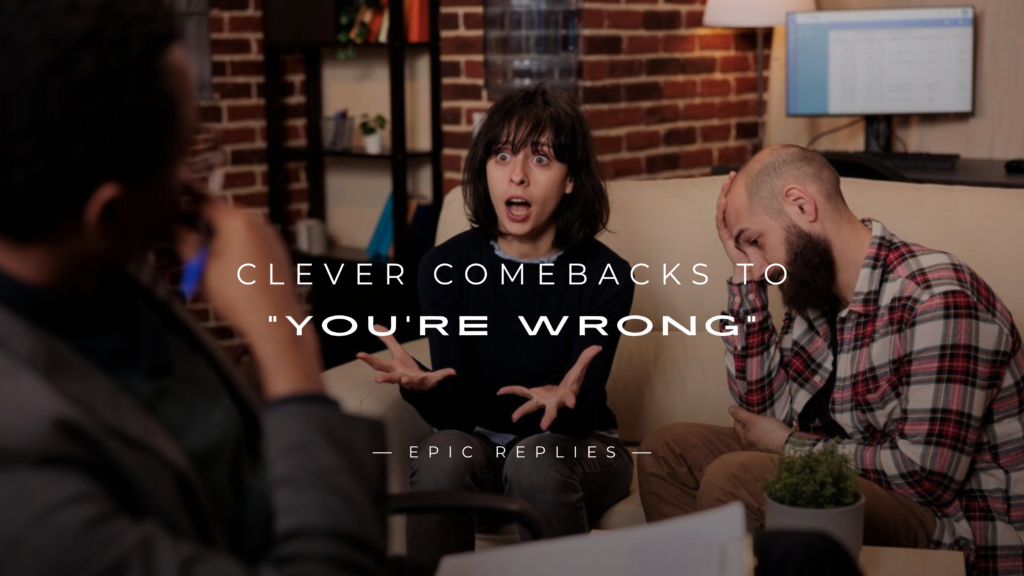We’ve all experienced it at some point: you’re in the middle of a conversation or debate, and suddenly someone says, “You’re wrong.” It’s a statement that can instantly create tension or discomfort. How do you respond effectively without escalating the situation? In this article, we’ll explore different strategies to respond to the phrase “You’re wrong,” focusing on approaches that keep the conversation respectful, productive, and even fun.

220+ Clever Comebacks To “You’re Wrong”
Playful/Lighthearted
- Wrong? More like I’m just creatively interpreting the facts!
- Oh no! Quick, call the ‘I’m Wrong’ police!
- I’m not wrong, I’m just giving you an alternate version of reality.
- Wrong? I’m just adding a little spice to the truth!
- Oops! Must be a glitch in the Matrix.
- Well, that’s one opinion, but my version is much more fun!
- Wrong is such a boring word. I like to think I’m ‘adventurous’ with facts.
- Psh, wrong? I’m just adding a plot twist!
- Oops! Looks like I forgot to bring my rightness today.
- Wrong? I’m just warming up for when I’m extra right later!
Witty/Sarcastic
- Oh, please, do tell me more with your infinite wisdom.
- I’m sure your opinion came from extensive research, right?
- Ah yes, you’re never wrong, are you? Must be exhausting.
- Wow, thank you for enlightening me. I was lost without you.
- Wrong? That’s cute. I’ll be sure to make a note of it in my diary.
- Oh no, how will I ever survive knowing I’m wrong in your world?
- I’d agree with you, but then we’d both be wrong.
- If I had a dollar for every time I’ve been told that, I’d be rich by now.
- You’re right… except for that one tiny detail—I’m not wrong.
- I can’t believe you think I’m wrong. I’m shook. Truly.
Confident/Assertive
- I stand by what I said, but thanks for sharing your thoughts.
- I’m not convinced I’m wrong, but we can agree to disagree.
- I hear you, but my opinion’s staying the same.
- I’m pretty confident I’m right, but feel free to prove me wrong.
- Respectfully, I don’t agree, and that’s okay.
- That’s one way to see it, but I still believe my stance is correct.
- You’re entitled to your opinion, but it doesn’t change mine.
- Interesting perspective, but I’m still sticking to my view.
- That’s a bold statement, but I think I’ve got this one right.
- I understand where you’re coming from, but I’m not backing down.
Logical/Calm
- I’m open to seeing it from your perspective, but could you explain why I’m wrong?
- I’d like to understand your reasoning, but I still stand by my point.
- I get that you think I’m wrong, but let’s look at the facts and see what’s really going on.
- We can examine this together, but I believe I’m on solid ground.
- I see your point, but I’ve come to a different conclusion based on the evidence.
- Let’s walk through this. I think there’s more to consider.
- I can appreciate your side, but I’ve got my own logic backing me up here.
- I’m happy to reconsider if there’s more information, but for now, I’m confident in my stance.
- I’m listening, but my opinion is based on the data I’ve seen so far.
- I can hear why you think I’m wrong, but my perspective still feels valid.
Humorous
- Me? Wrong? Must be some kind of alternate universe.
- Oh no, I better return my ‘I’m always right’ membership card.
- Wrong? Hold on, let me double-check with my rightness committee.
- Well, if being wrong feels this good, I think I’ll stay here for a while!
- You think I’m wrong? Well, that’s just fake news.
- If I’m wrong, the sky must be green and pigs are probably flying.
- Looks like I’ve officially hit my ‘wrong’ quota for the day!
- Wrong? That’s impossible, I checked my horoscope this morning!
- I didn’t realize being wrong was a talent. I’m clearly gifted!
- I must be wrong. Quick, somebody alert the authorities!
Polite/Respectful
- I respect that we don’t see eye to eye on this, but I still believe in my view.
- It’s okay to disagree, I appreciate hearing your side.
- I see why you think that, but I have a different perspective.
- I understand your point, but my opinion remains the same.
- Thank you for sharing your thoughts. I still think differently, though.
- I appreciate your input, but I’m confident in my stance.
- We may have to agree to disagree on this one, but I value the conversation.
- It’s great to hear other viewpoints, even if I still feel I’m right.
- I see where you’re coming from, but I’m not sure I can agree.
- I respect your thoughts, but I’m still comfortable with my position.
Philosophical
- Maybe there’s no right or wrong here—just different ways of seeing things.
- Who’s to say what’s truly right or wrong? Perspective shapes everything.
- The truth is often subjective; we might just be on different sides of it.
- Right or wrong can depend on where we’re standing.
- In a world with so many viewpoints, maybe we’re both a little bit right and a little bit wrong.
- I believe what I believe, but perhaps we’re just interpreting the same truth differently.
- Truth can be fluid, and what’s right for one might not be for another.
- There’s no absolute right or wrong, only experiences that shape our understanding.
- Maybe neither of us is wrong. We’re just walking different paths to the same truth.
- Philosophically speaking, being wrong might be just another way of learning.
Self-Deprecating
- Yeah, I’m wrong more often than I’d like to admit. Just ask my mirror.
- You’re right, I’m wrong—but I look good doing it!
- I’m wrong? Well, at least I’m consistent!
- Guess I’ll add this to my ‘Reasons I’m Wrong’ journal. Running out of pages, though.
- Wrong again! My streak is unbreakable.
- Wrong? This is just like that time I thought I was good at karaoke.
- I’ve been wrong before, but this one’s going in my Hall of Fame.
- Wrong? I must have left my logic at home.
- Yeah, I’ve been wrong so many times I should probably just accept my fate.
- Well, I’m wrong again! I’m like a broken clock—right twice a day.
Challenging
- Okay, but can you actually prove that I’m wrong?
- What makes you so sure about that?
- Why do you think that? I’d love to hear your reasoning.
- You seem confident. Care to back that up with facts?
- What evidence do you have that proves me wrong?
- Let’s see if you can convince me I’m wrong.
- Can you explain why you’re so certain? I’m listening.
- What part specifically do you think is wrong?
- That’s a bold statement. How exactly am I wrong?
- So, what’s your proof? I’m open to being convinced.
Dismissive/Cold
- Okay, if that’s what you think.
- I don’t have time to debate this.
- Sure, whatever makes you feel better.
- That’s nice. Moving on.
- Your opinion doesn’t really affect me.
- Alright. Let’s just agree that we’re done here.
- I’m not going to argue with you about this.
- I guess we’re done talking about it then.
- You believe that? Cool story.
- It’s not that deep. Let’s move on.
Passive-Aggressive
- Oh, of course, because you’re never wrong.
- Wow, you must be so proud of always being right.
- Oh, my mistake. I forgot you were the authority on everything.
- Thank you for pointing that out! What would I do without you?
- Oh no, how will I ever recover from being wrong in your eyes?
- I didn’t realize you were the expert on everything I say.
- It’s amazing how you’re always right. Must be exhausting.
- Thanks for letting me know. I’ll be sure to care next time.
- Oh, you must be so fun at parties with all this wisdom.
- You’re right, I’m wrong. I’ll sleep just fine tonight.
Curious/Inquisitive
- That’s interesting. Why do you think I’m wrong?
- I’m curious, what part of what I said seems off to you?
- Could you clarify exactly where you think I’m mistaken?
- What’s your reasoning behind that? I’d like to understand.
- I’d love to know why you feel that way.
- Can you explain your thought process? Maybe I’m missing something.
- Why do you think that? I’m open to hearing your point of view.
- Do you have any specific examples to back that up?
- I’d like to hear your take on this. Can you go into more detail?
- I’m curious—what makes you so confident in that statement?
Deflective
- Oh look, is that the time? I’ve gotta go!
- Hey, have you seen the new season of that show we both like?
- Anyway, back to something more fun…
- Let’s not get stuck on this. There’s so much else to talk about.
- Yeah, I could be wrong, but let’s not dwell on it.
- Moving on… this debate is going nowhere.
- Let’s just agree to disagree and talk about something else.
- Sure, let’s table this for later. What else is going on?
- Maybe I’m wrong, but honestly, I’d rather change the subject.
- Eh, that’s not really important. Let’s move on to something else.
Analytical/Technical
- Actually, based on the data I’ve seen, I’m fairly confident I’m right.
- According to the research, my stance is supported by the facts.
- Let’s break it down logically. Here’s why I think my view holds up.
- If you look at the evidence objectively, I think you’ll see I have a point.
- Statistically speaking, my argument is more likely to be correct.
- I’d be happy to go over the numbers with you if you’re open to it.
- Can we evaluate this step by step? I think the facts are on my side.
- I’m basing my opinion on the data available. What’s your source?
- Let’s examine the facts first before we jump to conclusions.
- If we analyze this properly, I think you’ll see where I’m coming from.
Self-Reflective
- Maybe I am wrong. I’ll have to think about that.
- You could be right. I’ll reflect on what you said.
- I’ve been wrong before, so I’ll definitely give this more thought.
- I’m open to the idea that I could be mistaken.
- That’s possible. I’ll reconsider and see if I missed something.
- It’s always good to question ourselves. I’ll look into it more.
- If I’m wrong, I’d definitely want to learn from it.
- I’ll admit, I haven’t considered every angle. I’ll reflect on this.
- You know what, I could have misunderstood the situation. I’ll revisit it.
- Maybe this is a learning moment for me. I’ll take some time to think about it.
Petty
- Oh, I must have missed the memo that you’re the boss of right and wrong.
- Well, if being wrong was an Olympic sport, you’d be the judge.
- I’ll be sure to file that under ‘things I don’t care about.’
- Let me guess, you’re never wrong, huh?
- How does it feel to be so perfect all the time?
- You saying I’m wrong doesn’t make you right, but keep trying.
- Wow, you caught me. Should I throw a party to celebrate your big win?
- Oh, I see. You’re that kind of person.
- Congrats on your flawless track record of always being right. Must be lonely up there.
- Well, at least I have better taste in shoes than you, so I guess we’re even.
Pop Culture/Reference-Based
- You think I’m wrong? In the words of Beyoncé, ‘You must not know ’bout me.’
- If I’m wrong, then Yoda I am not, hmmm?
- You can’t handle the truth! Or at least, not my version of it.
- Oh sure, I’m wrong, just like Ross wasn’t on a break.
- This is starting to feel like an episode of ‘The Office’ where Michael Scott thinks he’s right.
- I may be wrong, but at least I’m not ‘Game of Thrones’ season 8 wrong.
- If I’m wrong, then this is the multiverse where I’m still right somewhere else.
- You saying I’m wrong? That’s so 2010s, I’m living in 3023.
- You’re right, and I guess Thanos was just misunderstood.
- You’re calling me wrong? Well, just like Jon Snow, you know nothing.
Indifferent/Unbothered
- Okay, cool. Doesn’t change my day.
- You think I’m wrong? That’s fine, doesn’t affect me.
- Sure, I’m wrong. Not gonna lose sleep over it.
- Alright, whatever floats your boat.
- Okay, moving on.
- Thanks for the input, but it’s not really a big deal to me.
- That’s your opinion. Doesn’t really matter to me.
- Alright. If you say so.
- Okay, and? Life goes on.
- That’s cool. Doesn’t really bother me.
Defensive
- I’m not wrong, you just don’t understand what I’m saying.
- I’m right, but maybe you’re just not seeing the bigger picture.
- I actually put a lot of thought into this, so I don’t think I’m wrong.
- I know what I’m talking about, maybe you’re just not getting it.
- I don’t appreciate being told I’m wrong when I’ve done my homework.
- I’m not wrong, I just have a different perspective.
- You can’t just call me wrong without understanding where I’m coming from.
- I’m confident in my stance. Maybe you need to reconsider yours.
- I didn’t pull this out of thin air, so I’m sticking to my guns.
- It’s not that I’m wrong, you’re just misinterpreting what I said.
Reversal/Turnaround
- You think I’m wrong? Maybe it’s you who’s missing something.
- Funny, I was just about to say the same thing about you.
- Well, that’s interesting because from where I’m standing, you’re the one who’s off.
- I’m wrong? Or maybe you’re just not seeing the full picture?
- It’s possible I’m wrong, but have you considered you might be too?
- Oh, I’m wrong? Or are you just not willing to see another point of view?
- You might want to double-check that, because it seems like you’re the one who’s confused.
- It’s funny how people who think they’re always right are usually the most wrong.
- That’s one way to see it, but if we flip the script, maybe you’re the one who’s mistaken.
- I’m wrong? Or are you just not open to the possibility that you are?
Philosophical Joking
- In the grand scheme of the universe, does right or wrong even really matter?
- Maybe I’m wrong in this reality, but right in a parallel one.
- Who’s to say what’s wrong? Maybe we’re both just dancing in the gray area.
- Wrong or right, aren’t we all just a collection of stardust trying to figure things out?
- If I’m wrong, then perhaps the concept of ‘wrong’ needs to be re-evaluated.
- Right, wrong—it’s all just a construct, man. We’re just floating on this rock in space.
- Well, what is ‘wrong,’ really, but society’s way of limiting our infinite potential?
- Maybe I’m wrong today, but tomorrow, the world might catch up to my brilliance.
- In the grand cosmic ballet, can we truly define right or wrong?
- If I’m wrong, then maybe I’m just a philosopher ahead of my time.
Reassuring
- It’s okay if you think I’m wrong, we can still be friends.
- I understand why you think I’m wrong, but it’s no big deal.
- It’s fine if we disagree. Let’s not let it ruin a good conversation.
- Even if I’m wrong, I appreciate that we can talk about it.
- You might think I’m wrong, but it’s okay—we can agree to disagree.
- I can see where you’re coming from, and it’s alright if we see things differently.
- It’s totally fine if you think I’m wrong. Everyone’s entitled to their opinion.
- You know, I could be wrong, but that doesn’t change the fact that we’re still cool.
- It’s okay to disagree. This doesn’t affect anything important between us.
- Even if I’m wrong, we can move past it. It’s not the end of the world.
Understanding the Phrase “You’re Wrong”
- Why People Say “You’re Wrong”
When someone says, “You’re wrong,” their motivation can vary. It might be a genuine disagreement based on different interpretations of facts, or it could stem from misunderstandings. In some cases, the phrase is used to assert authority or dominance. Understanding why someone is saying this is the first step in forming an appropriate response.
- Common Reactions to Hearing “You’re Wrong”
A natural reaction to hearing “You’re wrong” is feeling defensive. You may want to immediately prove the other person wrong or shut down the conversation. However, there are more constructive ways to react. By staying calm and focused, you can engage in a healthy debate and avoid unnecessary conflict.
The Importance of Staying Calm
- Emotional vs. Logical Responses
When someone challenges your opinion by saying, “You’re wrong,” it’s easy to let emotions take over. But an emotional response often leads to further disagreement. Instead, focus on giving a logical response. Remaining calm and composed allows you to maintain control over the conversation, making you more persuasive in the long run.
- Why Reacting Aggressively Can Backfire
Reacting aggressively to being told “You’re wrong” can have unintended consequences. It might make you look defensive or closed-minded, and it can escalate the argument into a hostile confrontation. A calm demeanor, on the other hand, helps defuse tension and shows that you’re open to discussion, making it easier to resolve the disagreement.
Assess the Situation Before Responding
- Context Matters: Casual Conversation vs. Debate
The context of the conversation matters when you hear “You’re wrong.” Is it a friendly discussion, or are you engaged in a more formal debate? In casual conversations, a humorous or light-hearted response can keep things easy-going, while more serious debates might require a thoughtful, fact-based reply.
- Is the Person Trying to Help or Attack?
Not every instance of “You’re wrong” is meant to attack you personally. Sometimes, it’s constructive criticism or a way for someone to share their perspective. Before responding, try to understand whether the person is offering help or attempting to put you down. This will guide you in how to reply effectively.
Acknowledge Their Perspective
- Show Empathy in Your Response
Acknowledging the other person’s viewpoint is a great way to reduce tension. When someone says “You’re wrong,” instead of jumping into a defensive response, you can say, “I see where you’re coming from” or “That’s an interesting point.” Showing empathy doesn’t mean you’re agreeing with them—it just demonstrates that you’re open to their thoughts.
- How Acknowledgment Diffuses Tension
Acknowledging someone’s perspective can immediately make the conversation more civil. When people feel heard, they are less likely to argue aggressively. This simple act of listening can make your comeback more effective by opening the door to a calmer, more rational conversation.
Use Humor to Deflect
- When and How to Use Humor Effectively
Humor can be an excellent tool to diffuse a tense situation, especially when the argument is lighthearted. A funny or self-deprecating comeback can disarm the other person and make the conversation more enjoyable. For example, when someone says, “You’re wrong,” you might respond with, “Well, I’ve been wrong before, but I’m still right 99% of the time!”
- Lighthearted Comebacks that Work
Some humorous responses include:
“You’re wrong, but I’ll forgive you this time.”
“If I had a dollar for every time I was wrong, I’d be a millionaire!”
“Guess we’re both wrong, let’s flip a coin for the right answer!”
Clarify Misunderstandings
- How to Ask Clarifying Questions
When someone says “You’re wrong,” it’s possible they misunderstood your point. Instead of immediately defending yourself, you can ask clarifying questions like, “Can you explain what part of my argument you disagree with?” This gives the other person a chance to articulate their viewpoint and may reveal areas of agreement or misunderstanding.
- Reframing the Discussion to Gain Clarity
Reframing the conversation with a focus on understanding can shift the dynamic from confrontation to collaboration. By asking the right questions, you guide the discussion toward clarity and help both sides see the bigger picture.
Use Evidence to Support Your Point
- How to Present Facts Without Sounding Condescending
When using facts to back up your argument, the delivery is key. You want to avoid coming across as condescending. Instead of saying, “Well, the facts prove you wrong,” try something more neutral, like, “I’ve read that this might be the case. Let me show you.” This approach keeps the conversation civil while giving you a chance to present evidence.
- The Power of Citing Reliable Sources
In discussions where accuracy is important, citing reliable sources can make your argument much stronger. Whether you’re discussing a scientific topic or sharing factual information, references to credible sources can help validate your position and make it harder for the other person to dismiss your point.
Stay Confident but Open-Minded
- Balancing Assertiveness with Open Dialogue
Being told “You’re wrong” doesn’t mean you should immediately back down. Stay confident in your position, but also show that you’re open to considering new information. This balance of assertiveness and open-mindedness creates a healthy dialogue and encourages the other person to approach the conversation with the same attitude.
- Why Confidence Can Shift the Conversation
Confidence can be contagious. If you stand by your points calmly and confidently, it often forces the other person to rethink their own stance. Confidence also signals that you’re not easily shaken by disagreement, which can make the other party more likely to engage thoughtfully rather than aggressively.
Offer a Solution or Compromise
- How to Turn Conflict into Collaboration
When someone tells you “You’re wrong,” it’s tempting to double down on your argument. However, offering a solution or compromise can turn a potential conflict into a collaborative effort. For instance, suggesting a middle ground like, “I see where you’re coming from—maybe we can find common ground on this issue,” can help keep the conversation productive.
- Agreeing to Disagree: When It’s the Best Option
Not all disagreements need to end with a definitive winner. Sometimes, the best way to respond to “You’re wrong” is to agree to disagree. This shows maturity and respect for differing opinions. It’s a way to maintain harmony, especially in discussions where there’s no clear right or wrong answer.
Don’t Make It Personal
- Separate the Issue from the Person
It’s crucial to keep the conversation focused on the issue at hand and not make it personal. When someone says “You’re wrong,” it’s easy to feel like they’re attacking you, but in most cases, they’re just disagreeing with your opinion. Respond to the argument, not the person, to keep the discussion productive.
- Why Personal Attacks Lead Nowhere
Personal attacks shift the focus away from the real issue and can make the conversation spiral out of control. By keeping the discussion respectful and focused on the facts, you avoid unnecessary conflict and ensure that both parties remain open to finding common ground.
Turn the Tables with a Thoughtful Question
- Why Questions Are More Powerful Than Arguments
Instead of reacting defensively, asking a thoughtful question can often be more effective. For example, when someone says, “You’re wrong,” you could respond with, “What makes you think that?” or “How did you come to that conclusion?” This encourages the other person to explain their reasoning and opens the door for a more constructive conversation.
- Examples of Effective Questions in Debate
Some examples of powerful questions include:
“What would convince you otherwise?”
“Have you considered the possibility that both of us could be right in different ways?”
“Can you help me understand your perspective better?”
Admit When You’re Wrong (If You Are)
- Why Admitting Fault Can Boost Credibility
Admitting when you’re wrong can actually make you seem more credible. It shows that you’re more interested in finding the truth than in being right, which earns you respect from others. People appreciate honesty and the ability to admit mistakes—it’s a sign of emotional intelligence.
- How to Apologize Gracefully
If it turns out that you’re wrong, apologize gracefully and move on. A simple “You’re right, I didn’t see it that way,” can go a long way in maintaining relationships and showing that you value the truth over pride.
What to Avoid When Responding to “You’re Wrong”
- Avoiding Defensive Body Language
Your body language speaks volumes when responding to someone telling you, “You’re wrong.” Defensive gestures like crossing your arms, frowning, or rolling your eyes can escalate tension. Keep your posture open and relaxed to signal that you’re open to a respectful conversation.
- The Pitfall of Sarcasm or Passive-Aggression
Sarcastic or passive-aggressive responses might feel like a quick win, but they rarely lead to meaningful resolution. Instead, they can alienate the other person and make it harder to have a productive conversation in the future.
Practice Active Listening
- How Listening Can Change the Course of the Conversation
Sometimes, the best comeback to “You’re wrong” is simply to listen. Let the other person explain their viewpoint fully before jumping in with your response. Active listening shows respect and often leads to a more thoughtful and productive discussion.
- Using Their Words to Build a Stronger Comeback
By listening carefully, you can use the other person’s words to your advantage. For instance, you could say, “I hear you, and I agree with your point about X, but have you considered Y?” This shows that you’re paying attention and engaging with their argument, rather than just trying to win.
Conclusion
In conclusion, knowing how to respond when someone says “You’re wrong” is a valuable skill that can help you navigate difficult conversations with confidence and wit. Whether you’re aiming to diffuse tension with humor or stand your ground with a smart retort, having a collection of clever comebacks at the ready can make all the difference. And if you’re looking for more ways to handle challenging situations, check out our guide on 220+ Quick & Powerful Comebacks to ‘You Can’t Do That’ here. With these tools, you’ll be prepared to handle any verbal challenge that comes your way!
FAQs
Q. Why do people say “You’re Wrong” so often?
People often use “You’re wrong” to quickly assert their perspective or disagreement. However, the tone and intent can vary. Sometimes it’s an attempt to correct an error, while other times it could be more about asserting authority or dominance.
Q. What if the person keeps insisting I’m wrong?
If someone keeps insisting you’re wrong, calmly ask them to explain their reasoning and provide evidence. It’s also okay to agree to disagree if the discussion isn’t going anywhere productive.
Q. Should I always respond when someone says I’m wrong?
Not necessarily. Sometimes it’s best to let trivial disagreements slide, especially if the other person isn’t open to a productive discussion. You can choose when it’s worth engaging and when to move on.
Q. Can humor really work as a comeback?
Yes! Humor can defuse tension and make the conversation feel less adversarial. Lighthearted comments often disarm the other person and keep things friendly.
Q. How do I know when to let the argument go?
When the conversation becomes repetitive or hostile, it’s usually a sign that it’s time to let the argument go. Agreeing to disagree and moving on can prevent further conflict and maintain relationships.










